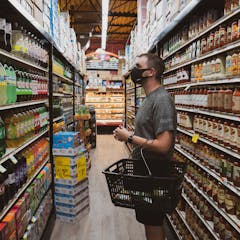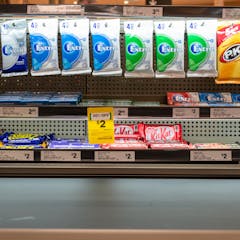
Articles on Junk food
Displaying 1 - 20 of 101 articles

Our food environments are designed in ways that often lead us to reach for unhealthy foods rather than healthy options.

A cup of coffee might help you kick-start your day, but it may actually make painful periods worse. Here’s what else to avoid (and eat) if you have period pain.

Our new study analysed the packages of around 8,000 food and drink products to understand the marketing techniques used.

Ultra-processed foods are bad for our health and our planet and must be central to any efforts to reduce our carbon emissions, and waistlines.

Tony Blair has called on ministers to tighten food regulation, including adding levies to foods high in fat, salt and sugar.

An effective national school food program can help build the foundations for a healthy population. That’s why Ottawa must limit the influence of the food industry on a national school food program.

Indonesians are consuming more and more processed foods, including sugary drinks, salty snacks, junk food, and unhealthy fats. These changes take a toll on people’s health, as well as the environment…

Australia’s food labelling system is under-performing. Here’s how we can make it more effective.

Researchers are trying to understand whether ultraprocessed foods erode brain health in the aging process.

Unlike some other countries, junk food remains inexpensive and easily accessible in Australia and is widely marketed to kids.

Ultra-processed foods that contributed the most dietary energy for Aussies included ready-made meals, fast food, pastries, buns, cakes, breakfast cereals, fruit drinks, iced tea and confectionery.

Exercise can’t make up for a poor diet, but it can help change eating habits. Regular exercise improves the brain and cognitive processes that help regulate junk food consumption and reduces stress.

Ultra-processed foods high in sugar, fat and empty carbs are bad for the mind as well as the body. Lack of micronutrients affects brain function and influences mood and mental health symptoms.

B.C. recently began taxing sugary drinks. Examples from Europe show the scientific basis for taxing unhealthy foods may have little impact on whether these taxes are adopted or remain in place.

During the pandemic, Australians have been using food delivery apps more than ever. We’ve assessed how healthy the options available to us are — and the news isn’t good.

Our new research found some deals provided an astonishing 90% of the average recommended daily energy intake for adults.

Unhealthy foods are readily available and heavily marketed to us, especially at supermarkets.

Our research found personalised nutrition advice, compared to usual dietary advice, helped adults to eat healthier.

Conflicting injunctions, shaped locally, constantly reinvented: food in the cities of the global south escapes the narrative of Western standardisation.

Many of us don’t get an adequate amount of nutrients.
